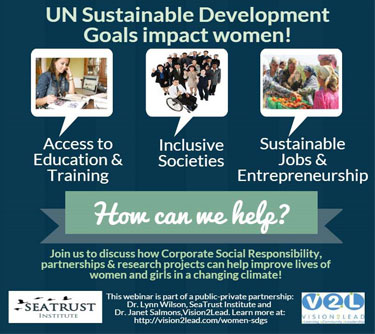AWARE in Kenya
By Jennifer Mwangi and Lynn Wilson
|
|
In 2015, Kenya experienced floods that displaced thousands of people and caused loss of lives and destruction of properties and infrastructure. In the first quarter of 2016, the country experienced several higher-than usual temperature events that increased the health risks of both humans and animals.
Although scientists attribute such global events to be associated with El Niño, it has been predicted that extreme weather events are likely to increase in frequency and intensity due to rising global surface temperatures caused by increased greenhouse emissions. The events increase the risk to public health as well as increase the economic burden of developing countries. Examples of health impacts include (both direct and indirect impacts): waterborne, foodborne diseases, undernutrition, cardiovascular and respiratory diseases.
The United Nation’s sustainable development goal (SDG) for health also targets the capacity strengthening of developing countries for early warning, risk reduction and management of national and global health risks by the year 2030. Although its implementation throughout Kenya within the 15-year timeframe is a big challenge, Kenya’s younger generation with 40 million people has the potential to play a key role in the capacity building of communities through programs designed to equip them with factual information necessary to engage the communities in matters such as policy discussions and community planning.
SeaTrust Institute, a nonprofit organization whose focus is to promote environmental research, education and policy in communities and countries and assist in climate change adaptation engagement has programs designed to help with capacity building and attainment of the country’s development goals - in line with the SDGs.
SeaTrust’s signature program is Action within a Resilient EnvironmentSM (AWARE), a community service program for high school students, built and designed by educators, scientists and experts at SeaTrust Institute to encourage action on environmental adaptation through community service and experiential learning projects.
Students who complete the program acquire community service credits by contributing to their communities while gaining valuable skills and experience. Students assess their communities’ vulnerabilities to impacts of climate change and the success of their projects is measured by the impact the adaptation option they choose has on the overall public health of their communities.
In 2016, SeaTrust Institute is collaborating with Ushahidi, a service provider for data collection and mapping products that have been used globally to map crisis information. With drought and floods identified as the two primary natural hazards that impact Kenya, the health impacts associated with them are significant.
Students in Kenya will assist with real-time data collection of climate change impacts for their communities to plan and choose appropriate adaptation options that develop and reinforce their early warning systems and enable them to reduce their risk to such health impacts. AWARE will be instrumental in helping Kenya meet its Vision 2030 goals and additional SDG targets while helping to integrate the Sendai Framework for Disaster Risk Reduction 2015-2030 into various sectors of the country. These include, but are not limited to, health, education, environment, water, agriculture, tourism, housing and science, technology and innovations sectors.
Jennifer Mwangi is the Program Manager for SeaTrust Institute’s AWARE Program. Lynn Wilson is the Founder and Executive Director for SeaTrust Institute.
